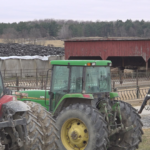
SUDBURY, Vt. (WCAX) – If Brian Kemp’s fall had a smell, it’d be cow manure.
Like many farmers, Kemp spent the post-flood months scrambling to deal with excess manure.
“A lot of pressure,” Kemp of Mountain Meadows Farm said of the aftermath. “You know, farmers were stressed all summer.”
Summer is typically the best time to spread manure, when soil is thirsty for water and nutrients. But last summer’s flooding saturated the soil, meaning manure couldn’t seep in. And manure lagoons, where farmers hold manure, filled up with water.
To avoid runoff, many farmers held off on spreading manure until the fall. Kemp spread his excess by October, spending an additional $25,000 in spreading costs.
Others were still spreading as winter picked up. Worried they wouldn’t meet the December 15 spreading deadline, farmers worked with the state to issue exemptions to farms needing to spread during the winter.
“We were trying to be proactive,” Kemp said. “I’d like to think that we came up with a good plan that was acceptable and mitigated, as much as we could, water pollution.”
Laura DiPietro with the Vermont Agency of Agriculture says they issued 49 exemptions. Those farms can spread a certain amount of manure on select days this winter. They aim to spread when the ground isn’t too frozen or wet, with no major snow or rain on the horizon to avoid runoff.
“None of these farms that are ever issued an exemption are allowed to let the manure go to water,” DiPietro said. “So they’re responsible to figure out how to manage it in the most environmentally sensitive way they can.”
So far, DiPietro says one farm’s manure leeched into a nearby waterway. They’re monitoring the other 48 carefully, investigating when calls come in about potential runoff.
UVM agronomist Heather Darby says the excess manure could have serious implications for crops, too.
“Diluted manure means that there’s less nutrients and organic matter which is really important for building soil health, and also important for feeding crops,” Darby explained.
Darby studied manure content from farms across the state, discovering up to a 78% decline in nutrients. She says farmers will need to spread around double the manure to achieve normal soil health and crop nutrition. This makes it even more important, Darby says, to time the spread right to avoid runoff.
Darby echos a sentiment voiced by Kemp and DiPietro: the summer’s floods show that more support and solutions are needed for farmers as extreme weather events continue to ramp up.
“We have to revisit our strategies and really think about what they’re going to look like into the future,” Darby said.
DiPietro says most farms with exemptions are wrapping up their spread. Anyone noticing signs of agricultural runoff can call the Vermont Agency of Agriculture.
